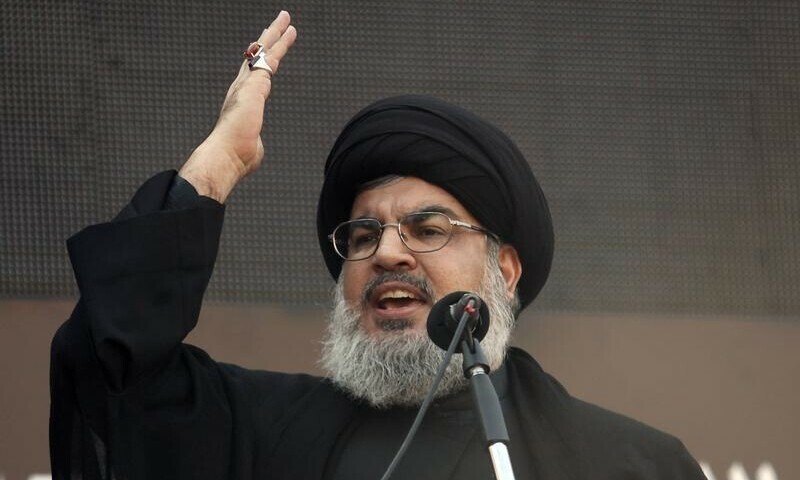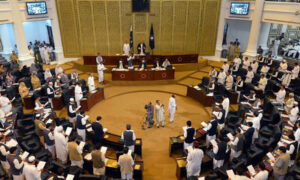Israel said on Saturday it had killed Hezbollah leader Sayyed Hassan Nasrallah in an airstrike in Beirut’s southern suburbs a day earlier, in what would be a devastating blow to the group as it reels from an escalating campaign of Israeli attacks.
Reuters could not immediately reach Hezbollah officials for comment. The allegedly Iran-backed Hezbollah has yet to issue any statement on the status of Nasrallah, its leader for 32 years.
If confirmed, Nasrallah’s death would mark a major blow not only to Hezbollah but also its alleged backers in Iran. He has long been a leading figure in the Tehran-backed “Axis of Resistance”, helping to project Iranian influence across the Middle East.
The Israeli military said in a statement that Nasrallah was eliminated in a “targeted strike” on the group’s underground headquarters under a residential building in Dahiyeh — a Hezbollah-controlled southern suburb of Beirut.
It said he was killed along with another top Hezbollah leader — Ali Karaki —and other commanders.
“The strike was conducted while Hezbollah’s senior chain of command were operating from the headquarters and advancing terrorist activities against the citizens of the State of Israel,” it claimed.
The Israeli military “eliminated … Hassan Nasrallah, leader of the Hezbollah terrorist organisation,” Israeli army spokesperson Avichay Adraee wrote in a statement on X.
“Hassan Nasrallah will no longer be able to terrorize the world,” the Israeli military said in a post on X on Saturday.
Late on Friday, a source close to Hezbollah told Reuters that Nasrallah was not reachable.
In the first hours after Friday’s strike, a source close to Hezbollah told Reuters that Nasrallah was alive. Iran’s Tasnim news agency also reported he was safe. A senior Iranian security official told Reuters that Tehran was checking his status.
Israeli airstrikes shake Beirut; more Hezbollah commanders killed
Friday’s airstrike on Dahiyeh shook Beirut. A security source in Lebanon said the attack — a quick succession of massively powerful blasts — had left a crater at least 20 meters deep.
Israel’s five hours of continuous strikes on Beirut early on Saturday followed Friday’s attack, by far the most powerful by Israel on the city during the conflict with Hezbollah that has played out in parallel to the Gaza conflict for nearly a year.
Reuters journalists heard more than 20 airstrikes in Beirut before dawn on Saturday and more after sunrise. Smoke could be seen rising over the city’s Hezbollah-controlled southern suburbs, known as the Dahiyeh.
Thousands of people have fled the area since Friday’s attack, congregating in squares, parks and sidewalks in downtown Beirut and seaside areas.
“They want to destroy Dahiyeh, they want to destroy all of us,” said Sari, a man in his 30s who gave only his first name, referring to the suburb he had fled after an Israeli evacuation order.
Nearby, the newly displaced in Beirut’s Martyrs Square rolled mats onto the ground to try to sleep.
The Israeli military said a missile fired at central Israel on Saturday had struck an open area. Earlier, the military said about 10 projectiles had crossed from Lebanon into Israeli territory and that some had been intercepted.
The Israeli military also said it was striking Hezbollah targets in the Bekaa Valley, a region of eastern Lebanon at the Syrian border that it has pounded over the last week.
The military said in a statement that it had killed the commander of Hezbollah’s missile unit, Muhammad Ali Ismail, and his deputy Hossein Ahmed Ismail.
Israel’s attacks in Lebanon have widened to new areas this week. On Saturday, an airstrike hit the Lebanese mountain town of Bhamdoun, southeast of Beirut, Lebanese lawmaker for the area Mark Daou told Reuters.
The mayor of Bhamdoun, Walid Khayrallah, told Reuters the strike hit a large empty lot and did not cause any casualties.
Lebanon death toll rises; people flee
Lebanese health authorities confirmed six dead and 91 wounded in the initial attack on Friday — the fourth on Beirut’s Hezbollah-controlled southern suburbs in a week and the heaviest since a 2006 war.
The toll appeared likely to rise much higher. There was no word on casualties from the later strikes. More than 700 people were killed in strikes over the past week, authorities said.
Hezbollah’s Al-Manar television reported seven buildings were destroyed.
Hours later, the Israeli military told residents in parts of Beirut’s southern suburbs to evacuate as it targeted missile launchers and weapons storage sites it said were under civilian housing.
Hezbollah denied any weapons or arms depots were located in buildings that were hit in the Beirut suburbs, the group’s media office said in a statement.
Alaa al-Din Saeed, a resident of a neighbourhood that Israel identified as a target, told Reuters he was fleeing with his wife and three children.
“We found out on the television. There was a huge commotion in the neighbourhood,” he said. The family grabbed clothes, identification papers and some cash but were stuck in traffic with others trying to flee.
“We’re going to the mountains. We’ll see how to spend the night – and tomorrow we’ll see what we can do.”
Around 100,000 people in Lebanon have been displaced this week, increasing the number uprooted in the country to well over 200,000.
Fears the fighting will spread
Hours before the latest barrage, Israeli Prime Minister Benjamin Netanyahu told the United Nations that his country had a right to continue the campaign.
“As long as Hezbollah chooses the path of war, Israel has no choice, and Israel has every right to remove this threat and return our citizens to their homes safely,” he said.
Several delegations walked out as Netanyahu approached the lectern. He later cut short his New York trip to return to Israel.
Hezbollah has fired hundreds of rockets and missiles against targets in Israel, including Tel Aviv.
The group said it fired rockets on Friday at the northern Israeli city of Safed, where a woman was treated for minor injuries.
At the UN, where the annual General Assembly met this week, the intensification prompted expressions of concern including by France, which with the US has proposed a 21-day ceasefire.
US Secretary of State Antony Blinken told a New York press conference: “We believe the way forward is through diplomacy, not conflict… We will continue to work intentionally with all parties to urge them to choose that course.”




